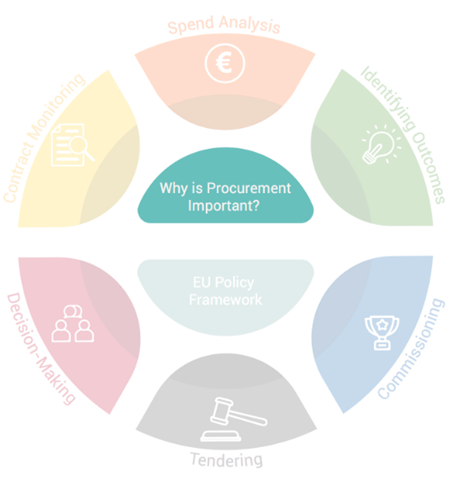Historically, Public procurement has been seen as a very dull and bureaucratic process, with decisions often made on the basis of lowest price and driven by complex EU and national law. However, in recent years, and inspired by the activities of two URBACT Networks (Procure and Making Spend Matter), and URBACT capitalisation activities through an online course, cities across Europe have started to adopt a more ‘strategic’ approach to Public Procurement. By this we mean, as well as considering the price and quality of businesses bidding for public procurement opportunities, procurers are also thinking about how the process can contribute to realising wider local economic, social and environmental outcomes.
When it comes to public procurement, the URBACT Programme has not only sought to change cultures but also, through Networks and capitalisation activities, create more Gender Equal Cities. This can entail a variety of measures, ensuring decisions around the design of services take into account the needs of different genders, reducing the Gender Pay Gap and making sure the politicians representing cities are representative of their communities.
Indeed, gender equality is a key cross-cutting theme of all 30 Action Planning Networks currently evolving on a range of themes. So, why has the GenProcure Network brought together the dual themes of public procurement and gender equality? Well, the Lead Partner City of Vila Nova De Famalicão (Portugal) recognised that, whilst cities are increasingly taking on social considerations (e.g. job creation) and environmental issues (e.g. climate change) in Public Procurement, they are not considering the implications their spending choices will have upon addressing inequality, and specifically Gender Inequality. The GenProcure Network is NOT seeking to ensure that Gender Equality considerations are included in all Public Procurement procedures, but that Gender becomes a consideration in relevant opportunities.
Realising this objective around changing the cultures of our nine partners around public procurement and gender equality is not going to be easy. Our partners face a range of key challenges around public procurement, and including bureaucratic and rigid procurement law, a lack of trained procurement officers around social and environmental considerations, a lack of willingness to take risks, and a lack of desire from the market to consider other aspects other than the price of the good, service or work they will provide. In addition, our partners face a range of challenges around gender equality and including around the traditional cultures of their countries, the lack of experience of addressing Gender Inequality, and challenges particularly around the pay and representation of women. All in all, there are a real lack of experiences in undertaking Gender Responsive Public Procurement.

The GenProcure APN, therefore, seeks to enable our cities to learn about how they can consider and embed gender equality in public procurement, and through the production of Integrated Action Plans, detail how they are going to shift public procurement cultures in the future, so that Gender Equality is a key consideration. Our Network is framed by the ‘Cycle of Public Procurement’, which details six key stages of the public procurement process at which social, environmental and gender factors can be considered. Our partners will learn about how they can understand the number of women owned enterprises that form part of their existing supply chain, how gender-focused outcomes can be included in Procurement Strategy, how gender considerations can be reflected in the design of services, the types of procedures that can be used to embed gender considerations in tendering, and how gender impacts can be measured into the delivery of contracts.
Image from URBACT Online Course on Strategic Procurement
Over the course of the last three months, we (the Lead Partner City and the Lead Expert) have visited each of our partners of: Koszalin (Poland), Satu Mare (Romania), Umeå (Sweden), Alcoi (Spain), Messina (Italy), Zenica-Doboj Canton Development Department (Bosnia and Herzegovina), Zagreb (Croatia) and Újfehértó (Hungary). In this we have realised that our partners have very different experiences when it comes to public procurement and gender equality, with some already having Gender Equality Plans in place and accompanied by a set of activities, others already engaging with Small and Medium-Sized Enterprises to make them aware of upcoming public procurement opportunities, and others having started to include social and environmental criteria. We have also realised that none of our partners are really doing work around Gender Responsive Public Procurement which makes GenProcure a fantastic opportunity.
The activities of GenProcure will not just be restricted to the APN – indeed, the City of Famalicão has already been asked to present at the Procura+ conference in Lisbon in March 2024, and our Lead Expert continues to feed URBACT’s work around Strategic Public Procurement into the activities of the EU Urban Agenda Partnership for Innovative and Responsible Public Procurement. As a Network, we are very much looking forward to taking work around Gender Responsive Public Procurement to the next level.
You can stay informed on updates from the GenProcure Action Planning Network through our dedicated webpage, where you can find more articles and expert insights.


